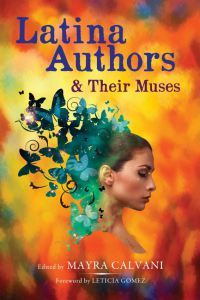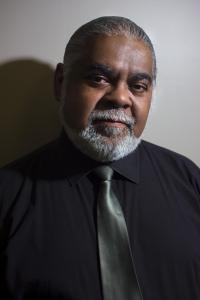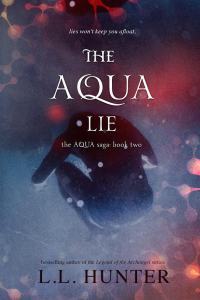Mayra Calvani's Blog, page 12
September 26, 2015
Celebrate Hispanic Heritage Month with ‘Latina Authors and Their Muses’
The Writing Life with Jane Tesh, Author of ‘Butterfly Waltz’

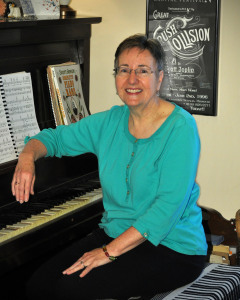 Jane Tesh is a retired media specialist and pianist for the Andy Griffith Playhouse in Mt. Airy, NC, the real Mayberry. She is the author of the Madeline Maclin Series, A Case of Imagination, A Hard Bargain, A Little Learning, and A Bad Reputation, featuring former beauty queen, Madeline “Mac” Maclin and her con man husband, Jerry Fairweather. Stolen Hearts is the first in the Grace Street Mystery Series, featuring PI David Randall, his psychic friend, Camden, Randall’s love interest, Kary Ingram, and Cam’s career-driven girlfriend, Ellin Belton, as well as an ever-changing assortment of Cam’s tenants. Mixed Signals is the second in the series, followed by Now You See It and Just You Wait. Jane’s mysteries are all published by Poisoned Pen Press, located in Scottsdale, Arizona.
Butterfly Waltz
is her first published fantasy novel from Silver Leaf Books. All of Jane’s books are on the light side with humor and romance.
Jane Tesh is a retired media specialist and pianist for the Andy Griffith Playhouse in Mt. Airy, NC, the real Mayberry. She is the author of the Madeline Maclin Series, A Case of Imagination, A Hard Bargain, A Little Learning, and A Bad Reputation, featuring former beauty queen, Madeline “Mac” Maclin and her con man husband, Jerry Fairweather. Stolen Hearts is the first in the Grace Street Mystery Series, featuring PI David Randall, his psychic friend, Camden, Randall’s love interest, Kary Ingram, and Cam’s career-driven girlfriend, Ellin Belton, as well as an ever-changing assortment of Cam’s tenants. Mixed Signals is the second in the series, followed by Now You See It and Just You Wait. Jane’s mysteries are all published by Poisoned Pen Press, located in Scottsdale, Arizona.
Butterfly Waltz
is her first published fantasy novel from Silver Leaf Books. All of Jane’s books are on the light side with humor and romance.Connect on the web:
https://www.facebook.com/GraceStreetMysterySeries
https://twitter.com/janetesh
http://www.janetesh.com/fantasy.html
What’s inside the mind of a fantasy author?
An amazing amount of “What if?” What if flowers could talk? What if an evil creature wants to be good? I explore these in Butterfly Waltz, but there are many more what ifs out there.
What is so great about being an author?
You can’t control your real life, what will happen, what people do or say, but you are in complete control of your fantasy world.
When do you hate it?
I can’t think of a single time when I hate it.
What is a regular writing day like for you? Be honest!
I get up at 6:30 and go for a walk in my neighborhood. Around 8, I get to work in my office and work until 11:30 or 12. Then I have lunch and spend some time with my Chihuahua, Pearl, until 1. From 1 until 3 I work some more and then I stop. If a story is going really well, I might work on it after supper. I look forward to being in my office. I don’t have a phone down there, and I disconnected the door bell, so it’s nice and quiet. Occasionally, Pearl will sit in my lap while I type.
Do you think authors have big egos? Do you? How do you know?
Hmm, well, I think authors have to believe in themselves and their work or they’d never get anywhere. I’d say I have a reasonable ego, especially now that I’ve been published. It’s given me the confidence to continue my writing career.
How do you handle negative reviews?
I try not to read any reviews. Everyone has an opinion, and I can’t make people like my work, so it’s better just to chug ahead and not read good or bad reviews.
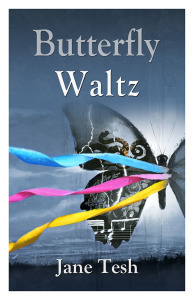 What is the usual response when you tell a new acquaintance that you’re an author?
What is the usual response when you tell a new acquaintance that you’re an author?People never fail to say one of two things, either, “Oh, I’ve always wanted to write a book,” or “My cousin/nephew/uncle/whatever has written a book about our family history/his experiences as a button collector/her life as a mountain midwife.” Stuff like that. Every time.
What do you do on those days you don’t feel like writing? Do you force it or take a break?
I’m usually working on several stories, so if one isn’t working, I switch to another. If the well is dry that day, I don’t force it. I do something different like mow the lawn or play the piano.
Any writing quirks?
As my editor loves to remind me, I use too many “just,” “some,” “well,” and “I knew.” I’m always rooting those out.
Have you worked on your novel intoxicated? What was the result?
Nope, not a drinker.
What would you do if people around you didn’t take your writing seriously or see it as a hobby?
I’m going to write no matter what, so people can think whatever they like. I’m okay with that.
Some authors seem to have a love-hate relationship to writing. Can you relate?
I’ve always loved it.
Do you think success as an author must be linked to money?
The thrill of opening a box of my latest books, seeing my work in a form I can hold and put on a shelf is worth more to me than any amount of money. I get paid royalties, but even if I didn’t, I would still write because it’s so much a part of me.
What had writing taught you?
No one takes your work as seriously as you do, so lighten up a little.
Leave us with some words of wisdom.
My favorite author, Terry Pratchett, says, “The first draft is just you telling yourself the story.”
Don’t worry about making it perfect. No matter how rough it is, it can be fixed. And a writer must have persistence. It took me a very long time to get published, but I never gave up.
September 3, 2015
The Writing Life with Florence Byham Weinberg
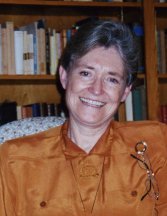 Florence Byham Weinberg, born in Alamogordo, New Mexico, lived on a ranch, on a farm, and traveled with her military family. After earning a PhD, she taught for 36 years in three universities. She published four scholarly books. Since retiring, she has written seven historical novels and one philosophical fantasy/thriller. She lives in San Antonio, loves cats, dogs and horses, and great-souled friends with good conversation. Visit her website and connect with her on Facebook.
Florence Byham Weinberg, born in Alamogordo, New Mexico, lived on a ranch, on a farm, and traveled with her military family. After earning a PhD, she taught for 36 years in three universities. She published four scholarly books. Since retiring, she has written seven historical novels and one philosophical fantasy/thriller. She lives in San Antonio, loves cats, dogs and horses, and great-souled friends with good conversation. Visit her website and connect with her on Facebook.About the Book:
Dolet depicts the life and times of Etienne Dolet. Etienne, who told the bald truth to friend and foe alike, angered the city authorities in sixteenth-century Toulouse, fled to Lyon, and became a publisher of innovative works on language, history, and theology. His foes framed him; he was persecuted, imprisoned, and ultimately executed by the Inquisition for daring to publish the Bible in French translation.
What readers are saying:
"[Dolet] ...I read it all with pleasure, and delighted to see names that I have known for some time coming alive as “characters,” albeit fictitious ones. I especially liked the way in which you brought out the sense of community, of being a band of brothers that so many of those amazing people shared.”
~ Kenneth Lloyd-Jones, Professor, Trinity College, Hartford, CT
Read Chapter One
Amazon / B&N / OmniLit
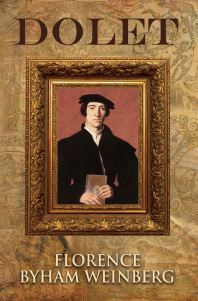 INTERVIEW
INTERVIEWWhat’s inside the mind of an author of historical fiction?
Two things. Her doctoral dissertation was on François Rabelais, a sixteenth-century comedic and satirical writer. In doing that, she became familiar with the dominant French literary and political figures of the century, their folkways and thought processes. She has written three historical novels, including the current novel, Dolet. The other branch of her historical novels concerns what we now call the Southwest—in other words her home territory, which she loves. She understands the people, knows the landscape, fauna and flora, and the psychology of her people. She has written about the founding of the five old Franciscan missions located in and around San Antonio (Apache Lance, Franciscan Cross), about the second expedition up the Rio Grande from Mexico (New Spain) in 1581 (Seven Cities of Mud), four mysteries starring a Jesuit missionary as detective (a historical person named Ignaz Pfefferkorn, S.J.) two set in the Sonora Desert, one in Spain and one in Germany. The outlier, Anselm, a Metamorphosis, is a fantasy set in upstate New York, where she lived and taught for 28 years. With Dolet, she returns to her beloved field as a scholar and professor, and attempts to reinstate Etienne Dolet among the great thinkers and writers of the 16th century in France.
What is so great about being an author?
The author is the god of his or her universe. This is truer if one is not bound by historical facts, but even if he or she is, the author still gets to imagine what happens in the gaps between those facts. Authorship transports the person—especially if the book is set in a foreign country at a different time—into another environment, with different folkways, politics, expectations, landscape, weather—in short, another universe. If, like author Weinberg, the writer aspires to write accurate historical fiction, it gives the opportunity to do research and to discover hitherto unknown facts. She has sorted through musty old documents in Mexico, in Spain: Madrid, Seville, Ciudad Rodrigo, and in Germany: Cologne, Unkel, Mannheim, Siegburg, Kiel and Düsseldorf. All her historical books (until this one) have appendices in which she clarifies what is fact and what fiction. The greatest thing about being an author is the joy of creation. The sense of elation when words are flowing effortlessly onto the page has no equal. This book calls itself a “nonfiction novel,” and since it endeavors to recreate true facts and situations, thre is no need for a historical appendix.
When do you hate it?
When words do not flow effortlessly onto the page. When the plot doesn’t work; the time sequences don’t match historical fact, but especially when interest in the chosen subject fades, and writing becomes a bore and a chore. This has happened rarely, but it has happened.
What is a regular writing day like for you?
If I’m lucky, I have long periods when I can devote myself to writing. If I am enjoying what I am working on, those periods are joyful. However, most days are interrupted by phone calls, visiting friends, doctor or other appointments, and other duties. Then, I have to fit my writing in and around an obstacle course. If I am particularly excited about what I’m writing, I will devote my late evening (say 10:30ff) to writing and continue into the wee hours, up to 2:00, rarely to 3:00 AM. I always rise at 8:00 AM and sometimes, when necessary, earlier, so a 2:00 or a 3:00 AM night causes hardship the next day.
Do you think authors have big egos? Do you?
Some do, some don’t. Egos vary with success, I think. I belong to a literary critique group, and we keep each other informed of our successes and our difficulties. We always help each other if possible, and we know each other quite well. But personalities and egos, obviously, differ. We have one member who has had to drop out of the group and move elsewhere, but who is quite successful, writing middle-school-age books. She has even had a TV film made based on one of them. She is still the same person—no inflated ego. One is writing creative nonfiction with much success. Maybe a flash of ego here and there, but mainly under control. Another is coming out with a new book this fall, her first, and still another has published with a small press about early 20th-century Texas. Two others are self-published with modest success, and I have published quite a bit with modest success. All in all, no inflated egos in sight.
How do you handle negative reviews?
My first reaction is hurt and disappointment. Then, if the reviewer has seen real flaws, I try to learn from it and avoid them in future. If the review was—objectively speaking—unjust, I feel anger. This is especially so if the negative reviewer has clearly not read the book, but publishes the negative review in a prominent journal or paper. I will grouse about it to my friends for a short time, and then let it go. Life’s too short to dwell on little bumps in the road.
What is the usual response when you tell a new acquaintance that you’re an author?
Usually they express enough interest that I can hand them a bookmark with a tiny reproduction of my cover illustration and a blurb with my URL. Once they have that in hand (or those—I carry bookmarks for all my books in my purse), they are willing to engage in conversation about my books. I have rarely met a person who brushes me off. It happens only very occasionally.
What do you do on those days you don’t feel like writing? Do you force it or take a break?
I take a break. I enjoy walking or hiking, and sometimes take day trips to interesting places near San Antonio. This doesn’t happen often, because I do work out for an hour in the Olympic Gym three times a week and walk for an hour on the other days. That normally keeps my writing juices flowing.
Any writing quirks?
Probably that I am willing to go to great lengths to research my topic before I write. I have delayed starting a novel for up to a year while building a firm foundation for my leap into prose. This has been especially true for the book I am now working on. I have spent weeks reading books on the subject and going through documents in the Alamo Historical Archive. Most authors probably don’t feel the obligation to go to such lengths.
Have you worked on your novel intoxicated? What was the result?
Yes. Never blind drunk, obviously. The effect is that inhibitions are gone and the imagination is often freed to take flights it might not when sober. On the whole, I found that good ideas and good writing can result. I don’t do this often, however, since I don’t want to tip over into alcoholism!
What would you do if people around you didn’t take your writing seriously or see it as a hobby?
I’m in constant fear that the IRS will see my writing career as a hobby! I have had recent experience of a colleague from my days as professor, who spoke slightingly of my pulp fiction. I engaged him in a conversation about the issues raised by some of my books, and by the end of that he apologized for not taking me seriously. I have no idea what he really says behind my back, however.
Some authors seem to have a love-hate relationship to writing. Can you relate?
Not really. If I hated it, I wouldn’t do it. I hear often about the “agony of writing” from authors with sterling reputations, but I have never found it so, and I thank God that my chosen occupation doesn’t make me suffer!
Do you think success as an author must be linked to money?
No, since writing is a joy in itself for me. On the other hand, a little cash beyond my retirement annuity would be most welcome!
Leave us with some words of wisdom.
Write every day if possible. Set up specific times and a designated place that you can devote entirely to your writing. Know roughly what your plot is, but don’t outline, since your characters need the freedom to tell you where to go next. Edit your writing the morning after, then continue writing. Show your writing to friends and take their suggestions seriously. Join a critique group if possible. Once you are finished, let a couple of friends read your book. You’ll be amazed at the typos, syntactical snarls, and perhaps logical snafus they will find. Then re-edit. Most of all, enjoy what you’re doing, else you won’t carry through to the end.
August 18, 2015
A Chat with Jonathan Raab, Author of ‘Flight of the Blue Falcon’

 Jonathan Raab is a veteran of the Afghanistan war, where he served as an infantryman assigned to a combat advisor team. He is the editor-in-chief of Muzzleland Press and an editor for the War Writers’ Campaign. His work has appeared in The New York Times’ At War Blog, CNN.com, the Military Success Network, Literati Presents, The Stars and Stripes, and many others. His second novel, The Hillbilly Moonshine Massacre, will be available in late 2015. He lives in the Denver metro area with his wife Jess and their dog, Egon.
Jonathan Raab is a veteran of the Afghanistan war, where he served as an infantryman assigned to a combat advisor team. He is the editor-in-chief of Muzzleland Press and an editor for the War Writers’ Campaign. His work has appeared in The New York Times’ At War Blog, CNN.com, the Military Success Network, Literati Presents, The Stars and Stripes, and many others. His second novel, The Hillbilly Moonshine Massacre, will be available in late 2015. He lives in the Denver metro area with his wife Jess and their dog, Egon.Connect with Jonathan Raab on the Web:
Website / Facebook /Twitter
Q: Congratulations on the release of your book, Flight of the Blue Falcon. To begin with, can you gives us a brief summary of what the story is about and what compelled you to write it?
The novel is about three men who serve in an infantry platoon deployed to the Afghanistan War. It follows their training, their deployment, and a little bit of them coming home from it all. I wanted to tell the story of men serving in the Long War, especially from the National Guard perspective.
Q: What do you think makes a good military novel? Could you narrow it down to the three most important elements? Is it even possible to narrow it down?
War writing tends to be nonfiction, but I think fiction is the best place to tell war stories. You can tell more truth that way. Every war is different; every war is the same. But every good war story should have good characters, be accessible to civilians, and tell something new (if possible) or true (as true as a story about war can be).
Q: How did you go about plotting your story? Or did you discover it as you worked on the book?
I tend to outline everything from the start, but that outline changes as I write. It’s a constant process of writing to catch up with the outline, and discovering that the plot is moving in new and unexpected directions.
Q: Tell us something interesting about your protagonist and how you developed him or her. Did you do any character interviews or sketches prior to the actual writing?
I have three protagonists in the novel, which is something I wouldn’t recommend to aspiring writers! Each character offered a unique perspective on the book’s events. They’re all based on guys I know, in whole or in part. A little bit of me is in each of them, too.
Q: In the same light, how did you create your antagonist or villain? What steps did you take to make him or her realistic?
There’s no real antagonist. The Taliban is in this book, of course, but they’re not really the focus. This is more of a character study—how three men deal with going through the Big Green Army Machine.
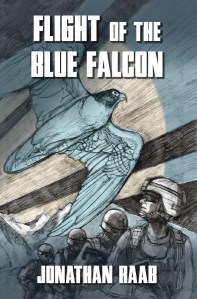 Q: How did you keep your narrative exciting throughout the novel? Could you offer some practical, specific tips?
Q: How did you keep your narrative exciting throughout the novel? Could you offer some practical, specific tips?I tend to write short, focused chapters. That helps the reader feel accomplished as they go—hey, I finished another chapter!—and so they keep reading. Each scene should communicate something new and important about your characters, the plot, or (preferably) both. If your scene doesn’t do that, cut it. Cut it right out.
Q: Setting is also quite important and in many cases it becomes like a character itself. What tools of the trade did you use in your writing to bring the setting to life?
There’s several settings here—but the prevailing setting is that of the Army culture itself. The use of specific language, cultural tropes, and illustrative anecdotes or scenes helps to communicate that to an audience that may not have served in the military. Try to tell larger truths about the setting or culture in small, focused ways. For example, there’s a scene where our characters arrive in Afghanistan on a big command base. Instead of being greeted by enemy fire and soldiers around them ready for combat, they’re screamed at for minor uniform infractions. That scene tells a lot about the culture and the situation, and what’s to come for our characters.
Q: Did you know the theme(s) of your novel from the start or is this something you discovered after completing the first draft? Is this theme(s) recurrent in your other work?
The broader theme is that war is stupid—on several levels. I knew that going in, and my characters and plot didn’t disappoint in that regard.
Q: Where does craft end and art begin? Do you think editing can destroy the initial creative thrust of an author?
Editing should refine the creative thrust. If it compromises it, it’s not really editing, it’s revision. That said, authors need to know when to throw out those lines or scenes they really love—we can convince ourselves something is really good when it is in fact unnecessary or even distracting.
Q: What three things, in your opinion, make a successful novelist?
1) The novelist finishes a novel. 2) The novelist is open to intense but fair criticism to make the book better. 3) The novelist keeps writing, and keeps improving.
Q: A famous writer once wrote that being an author is like having to do homework for the rest of your life. What do you think about that?
It’s like homework, sure, but it’s also a lot of fun. It’s also very frustrating. It’s a love-hate activity, for sure.
Q: Are there any resources, books, workshops or sites about craft that you’ve found helpful during your writing career?
This is a cliché, but Stephen King’s On Writing is really, really good. I’ve taught a part of it in my English class. I’ve never been to a workshop, so I can’t speak to that. I will say that you don’t need a fancy MFA or creative writing degree to be a writer, although those things can certainly be helpful to many people.
There’s a whole industry designed to separate writers from their money, so don’t go chasing expensive conferences, retreats, or seminars. They might be helpful, but you can probably learn more from joining a free writers’ group or just plugging away at the craft. Books are cheap, so read all the time. And it doesn’t cost you anything to write and share your work with trusted friends who will give you open and honest feedback.
You just have to be ready to be told that your precious baby of a story sucks, because you will write something that is awful. And that’s okay. What matters is how you deal with your failures—large and small. Don’t quit. Keeping writing. Even if it takes you the rest of your life to get published.
Q: Is there anything else you’d like to share with my readers about the craft of writing?
Don’t let your own ego get in the way of producing better work. Also, don’t worry about being a perfectionist—write, write, and write until that project of yours is finished. You can fix all of your issues in editing, when you open the door to others, and when you can read your own work with fresh eyes.
A Chat with Sophia Bar-Lev, Author of ‘The Silver Locket’

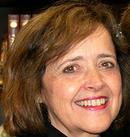 A native of Massachusetts, Sophia Bar-Lev divides her time between the Fort Worth, Texas area and Israel. A former school teacher and adult education lecturer, Bar-Lev now devotes the majority of her time to writing. Sophia Bar-Lev is also the author of Pasta, Poppy Fields, and Pearls and Pizza and Promises. The Silver Locket is her latest novel.
A native of Massachusetts, Sophia Bar-Lev divides her time between the Fort Worth, Texas area and Israel. A former school teacher and adult education lecturer, Bar-Lev now devotes the majority of her time to writing. Sophia Bar-Lev is also the author of Pasta, Poppy Fields, and Pearls and Pizza and Promises. The Silver Locket is her latest novel.Connect with the author on the web:
http://www.sophiabarlev.com/
http://www.sophiabarlev.com/#!blog/cnf7
https://www.facebook.com/SophiaBarLevAuthor
Q: Congratulations on the release of your latest book, THE SILVER LOCKET. To begin with, can you gives us a brief summary of what the story is about and what compelled you to write it?
A: This novel is celebrates the triumph of the human spirit over tragedy and heartache. It chronicles the lives of two women whose lives are linked by a child that belongs to both of them but in different ways. Their common devotion to motherhood and family ultimately leads to a powerful and fulfilling reunion. The power of a sensitive and difficult decision years earlier is realized as two families join their hearts and lives because of one special daughter they share. My inspiration came from the true story of a friend who wanted her story told and was delighted that I would write it for her.
Q: What do you think makes a good contemporary novel? Could you narrow it down to the three most important elements? Is it even possible to narrow it down?
A: A novel doesn’t deny reality; it interprets reality. The novels I appreciate and enjoy reading relates to the contemporary reader in a way that adds value to his/her life. This what I endeavor to do in my writing. The importance of character development cannot be overstated. Imagination must blend seamlessly with realism to produce for the reader a sense of connection or identification with the personalities in the book.
Q: How did you go about plotting your story? Or did you discover it as you worked on the book?
A: In the case of THE SILVER LOCKET, I knew the basic story ahead of time so my primary task was to follow the real life plot as told to me by my friend. However, in my other novels, I start with an idea which morphs into an overview but as I write, very often the characters pull me into directions I didn’t anticipate when I started the project. Personally, I’ve never outlined a book ahead of time. I tend to write more spontaneously and, as they say, ‘go with the flow’.
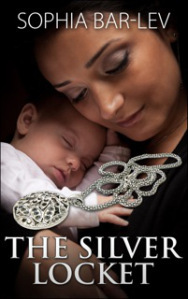 Q: Tell us something interesting about your protagonist and how you developed him or her. Did you do any character interviews or sketches prior to the actual writing?
Q: Tell us something interesting about your protagonist and how you developed him or her. Did you do any character interviews or sketches prior to the actual writing?A: For this novel I invested considerable time in learning everything I could about the two women who are the primary characters throughout the novel. My friend’s descriptions and insights into her birth mother and adopted mother were very helpful and gave me a solid basis for building the narrative. Yes, I did write up two character interviews while I was writing the book and later revised them after the book was finished. I found the practice very helpful not only for this novel but for my other novels as well.
Q: In the same light, how did you create your antagonist or villain? What steps did you take to make him or her realistic?
A: This took a bit more imagination than the development of the protagonists. Actual information about this person was sketchy so I did some research into the general traits of the kind of person he needed to be in the story and received some advice from a local police officer as well, not only regarding the criminal but also about the types of laws applicable at the time.
Q: How did you keep your narrative exciting throughout the novel? Could you offer some practical, specific tips?
A: To keep a reader turning the pages requires enough mystery or suspense to create continual curiosity. As a writer moves through the chapters, unexpected twists to the story act like bait to ‘hook’ the reader to keep going. In this novel, I inserted events and conversations at strategic intervals to create or increase the suspense and add depth to the story.
Q: Setting is also quite important and in many cases it becomes like a character itself. What tools of the trade did you use in your writing to bring the setting to life?
A: Descriptions must be written in such a way that the reader can paint a picture in his/her mind of the various settings in the course of the novel. Carefully chosen words, similies, analogies and references will all contribute to dynamic settings so that – in a manner of speaking – the book becomes a movie in the mind of the reader.
Q: Did you know the theme(s) of your novel from the start or is this something you discovered after completing the first draft? Is this theme(s) recurrent in your other work?
A: In this case, yes I knew the theme from the beginning. In my other novels, I had a general idea but the themes developed as I wrote so that by the time I completed each novel, the theme was clear and distinct.
Q: Where does craft end and art begin? Do you think editing can destroy the initial creative thrust of an author?
A: Craft and art – art and craft: which comes first? Hard to say. I think the most successful novel is the result of free-flowing ‘art’ or creativity, which is later reviewed, revised and edited so that the level of the craft enhances the art contained within the novel itself.
Q: What three things, in your opinion, make a successful novelist?
A: Persistence, diligence and a passion for excellence are imperative for any writer to become a successful novelist. Actually, I think these three qualities are essential for success in any area of life but as we’re discussing authors, I would add that every author has to be willing to throw away as much or more than they actually publish. Writing is a ‘practice’ as well as an art. I write every day and much of it ends up in the dust bin but it’s not wasted time; it’s practice and practice makes perfect.
Q: A famous writer once wrote that being an author is like having to do homework for the rest of your life. What do you think about that?
A: I love writing so if this is homework for the rest of my life, bring it on! I’m a firm believer in the maxim that if you love what you do, you won’t ‘work’ for the rest of your life. Your ‘work’ becomes your joy.
Q: Are there any resources, books, workshops or sites about craft that you’ve found helpful during your writing career?
A: Yes I regularly read postings from Writers’ Digest and subscribe to their magazine as well. I attend writers’ workshops as often as I can and read books about writing. I found Stephen King’s book, ON WRITING and BIRD BY BIRD by Anne Lamott helpful and inspiring. I’m also a great fan of the series of books for writers by Julia Cameron. Her works continue to be a resource I go back to frequently.
Q: Is there anything else you’d like to share with my readers about the craft of writing?
A: I have a small book on my desk which a friend recently sent me. It’s entitled, YOU’RE A WRITER SO ACT LIKE IT. I haven’t read the book yet but I love the title. Anyone who aspires to be a writer needs to put in the time to develop the skills that a creative imagination requires in order to marry ideas to effective expression. I daresay there are many potential writers who are not lacking in ideas but in the will and persistence to do the work required to turn their imaginations into printed material. Great ideas are not enough; the mechanical skills for producing a winning manuscript are essential. And that, my friends, takes work.
////////////////////////////////////////////////
Title: THE SILVER LOCKET
Genre: Women’s Fiction
Author: Sophia Bar-Lev
Website: www.sophiabarlev.com
Purchase on Amazon
About the Book:
When The Silver Locket opens, it’s July 1941 in Boston, Massachusetts. War is raging in Europe and the Pacific. But for two young women in a small town in New England waging their own personal battles, the struggle is way too close to home.
When extraordinary circumstances bring these two women together, one decision will alter the course of their lives. And with that one decision, their lives will be forever changed…and forever intertwined.
Were these two women thrust together by happenstance—or fate? A tragedy. A decision. A pact. Lives irretrievably changed. A baby girl will grow up in the shadow of a secret that must be kept at all costs. But will this secret ever see the light of day? And what happens when—or if—a promise made must be broken?
Adopting a child is not for the feint of heart—but neither is being adopted…
A sweeping and suspenseful story that unfolds in a different time and a different place, The Silver Locket explores universal themes that ring true even today. Secrets. Unbreakable bonds. The healing power of love. Deception. Anguish. Redemption.
In this touching and tender tale, novelist Sophia Bar-Lev weaves a confident, quietly moving story about adoption, finding hope in the face of hopelessness, and how true love can overcome any obstacle. With its brilliant juxtaposition of the wars fought both on the battlefield and internally, The Silver Locket is a poignant novel, resplendent with drama. Featuring an exceedingly real and relatable plot, and characters that will stay with readers long after the final page is turned, The Silver Locket is a sterling new read.
August 14, 2015
"A Criminal Mind" – Guest Blog by Arnaldo Lopez Jr., author of 'Chickenhawk'
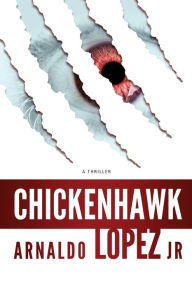 I enjoy a good murder. Oh, not necessarily an actual murder, but the kind of murders that occur between the pages of a good book. People ask me all the time, “What made you write about such gruesome stuff?” I rarely have a good enough answer for them and the person asking usually leaves somewhat disappointed. How do you explain to the casual observer, reader, or even fan that you are possessed of a mind filled with all sorts of criminality?
I enjoy a good murder. Oh, not necessarily an actual murder, but the kind of murders that occur between the pages of a good book. People ask me all the time, “What made you write about such gruesome stuff?” I rarely have a good enough answer for them and the person asking usually leaves somewhat disappointed. How do you explain to the casual observer, reader, or even fan that you are possessed of a mind filled with all sorts of criminality?Writers of thrillers, crime fiction, mysteries, etc. dwell in worlds bathed in foggy nights and overcast days. Peaceful ponds and lakes are actually places where bodies rise to the surface, pristine winter snows hide the corpses of hitch-hikers, runaways, or promising college students. We who write about crime must lurk in these dark places, it is who we are. And as a consequence we must also rise squinting into the sun and seek justice for those who have been so wronged. We create doctors, lawyers, detectives, housewives, writers, and even vampires who are willing to use their knowledge, skills, instinct and need to bring the bad guy to justice; to solve the very crime or crimes that we previously have so painstakingly committed on paper. It’s like knitting a wonderfully intricate afghan and then carefully pulling it apart as soon as it’s done.
But, alas, it’s what we do. Oh, and don’t get it wrong. Sure we create great antagonists. Some are evil geniuses, some are sociopaths and some are complete pychopaths! We use words like unsub, perp, the suspect, and so on to describe them, but isn’t the blood actually dripping from our hands?
It takes a very special mindset to just be a writer in the first place: to tackle
head on that blank page and build a world in which you hope to immerse your reader. And it’s even more special when it’s a criminal mind.
////////////////////////////////////////////
Title: Chickenhawk
Genre: Thriller
Author: Arnaldo Lopez Jr.
Publisher: Koehler Books/Café Con Leche books
Purchase on Amazon
About the Book:
Chickenhawk is an urban crime fiction novel that showcases New York City’s diversity, as well as the dark side of race relations, politics, sexuality, illness, madness, and infidelity. Eddie Ramos and Tommy Cucitti are Manhattan North Homicide detectives after a serial killer that manages to stay below their radar while the body count keeps climbing in a city that’s turning into a powder keg.
About the Author:
Arnaldo Lopez Jr. has been employed by New York City Transit for twenty-eight years and was formerly employed as a dispatcher with the NYPD. Mr. Lopez is also a speaker and trainer, speaking on subjects as diverse as terrorism and customer service. He created the civilian counter-terrorism training program currently in use by New York City Transit and many other major public transportation agencies around the country.
As well as writing, Mr. Lopez is an artist and photographer, having sold several of his works over the years. As a writer he’s sold articles to Railway Age magazine, The Daily News magazine, Homeland Defense Journal, and Reptile & Amphibian magazine; scripts to Little Archie and Personality Comics; and short stories to Neo-Opsis magazine, Lost Souls e-zine, Nth Online magazine, Blood Moon magazine, and various other Sci-Fi and/or horror newsletters and fanzines. He was also editor of Offworld, a small science fiction magazine that was once chosen as a “Best Bet” by Sci-Fi television. Chickenhawk is his first novel.
July 31, 2015
On the Spotlight: The Aqua Lie, by L.L. Hunter
Release Date: July 31st
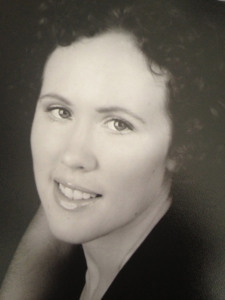 L.L. Hunter is the author of over 20 published works, including The Legend of the Archangel Series and The Eden Chronicles. She has studied everything from veterinary nursing, forensic science, and dramatic arts, but has always known her true calling was to be an author. She has been writing since her teens - everything from fan fiction, to song lyrics, to plays and musicals. When not working on her next paranormal romance, she can be found at home in Australia, reading somewhere comfortable with one or both of her “fur babies.”
L.L. Hunter is the author of over 20 published works, including The Legend of the Archangel Series and The Eden Chronicles. She has studied everything from veterinary nursing, forensic science, and dramatic arts, but has always known her true calling was to be an author. She has been writing since her teens - everything from fan fiction, to song lyrics, to plays and musicals. When not working on her next paranormal romance, she can be found at home in Australia, reading somewhere comfortable with one or both of her “fur babies.”July 30, 2015
Talking Craft with M.D. Moore, author of ‘Waiting for the Cool Kind of Crazy’

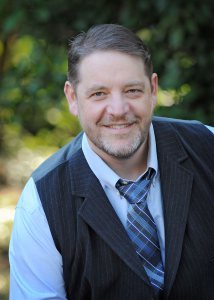 A native of Tacoma, Washington, M.D. Moore worked as a therapist in Washington State’s most acute psychiatric hospital. Moore currently serves as a rehab director at a long term care facility serving veterans and their families. A member of the Pacific Northwest Writers Association, M.D. Moore lives in Gig Harbor, Washington with his wife and sons. Waiting for the Cool Kind of Crazy is his debut novel. Visit M.D. Moore online at: www.mdmooreauthor.com.
A native of Tacoma, Washington, M.D. Moore worked as a therapist in Washington State’s most acute psychiatric hospital. Moore currently serves as a rehab director at a long term care facility serving veterans and their families. A member of the Pacific Northwest Writers Association, M.D. Moore lives in Gig Harbor, Washington with his wife and sons. Waiting for the Cool Kind of Crazy is his debut novel. Visit M.D. Moore online at: www.mdmooreauthor.com.Q: Congratulations on the release of your book, Waiting for the Cool Kind of Crazy. To begin with, can you give us a brief summary of what the story is about and what compelled you to write it?
A: My story is about a middle-aged son of a paranoid schizophrenic mother who has the problems of the world on his shoulders, but doesn’t have the skills to navigate them all successfully. He has a mentally ill mother who still is the cause of chaos in his life, a life threatening illness, a failing business, and a host of people who want to see him fail on all fronts. He also has two legal strikes (a third would result in a sentence of mandatory life in prison without parole) and anger issues. He is forced to see a therapist against his better advice who seems to have as many issues as he has. The only bright spot in his life is his reunion with his high school sweetheart, but even she is just recently divorced from his high school adversary who has the power to destroy what Harmon has worked to build. The story focuses on how he navigates and untangles the messes of his life to a logical conclusion.
I worked in my state’s largest psychiatric hospital for several years and one of the patients had a husband and two teenage boys which was very unusual. Most of the patients had never been married or if they had been, had been divorced. The family’s dedication to their wife and mother was very touching, but I always felt sorry for all of them realizing how hard it must be for each one for their own reasons. It inspired this story of a man and his schizophrenic mother and the life they have shared.
Q: What do you think makes a good family saga? Could you narrow it down to the three most important elements? Is it even possible to narrow it down?
A: I think the single most important element of a family saga is it has to feel real. Many of the occurrences in my book would be far fetched to readers who are not familiar with the mentally ill and what struggles they face, but I believe the reader could still see the plausibility of the events. Now, this may sound somewhat contradictory to condition one, but you must also make it exciting enough that it doesn’t sound so real, that it could just happen to anyone, especially the reader. I’ve judged several writing contests and one of the biggest flaws I’ve seen is that people make their stories sound so real, they could’ve easily happened to the reader. Ok, your protagonist is buried in bills – been there. Oh no, your protagonist had a fight with their wife or kids – done that. Shoot, your protagonist is fat and needs to lose weight – it would be a bigger stretch if that person was in shape. Make real world problems, just make them someone else’s real world problems. The last element in a family saga, or for any realistic fiction for that matter, is to make your characters relatable. Make your protagonist someone like your Uncle Paul or your grandfather with maybe a little scar here or there – make your person someone who could exist.
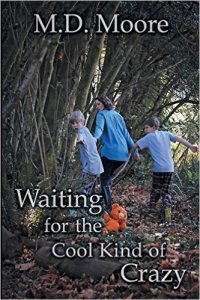 Q: How did you go about plotting your story? Or did you discover it as you worked on the book?
Q: How did you go about plotting your story? Or did you discover it as you worked on the book?A: I tried the free-flowing method and I ended up making a mess all over myself. There were pieces of book all over the place and a story that got me more lost than my first version of Mapquest. Unfortunately, and I say unfortunate because I wish I had the skill to just “let the story happen,” I am a meticulous plotter. My chapter summaries are almost as long as the chapters themselves. I need to know where I’m going so I don’t waste too much energy trying to find my way with a sundial. Give me a programmed GPS and just let me write.
Q: Tell us something interesting about your protagonist and how you developed him or her. Did you do any character interviews or sketches prior to the actual writing?
A: My protagonist, Harmon, is actually a combination of a lot of people. He shares character traits of a couple of family members and friends and physically, he’s also a combination of several people. I actually had a little photo album, the type you’d get as a kid, that had several pictures in it that I would reference on occasion when describing Harmon. In the editing process, however, I ended up taking a lot of physical description out as I like to let the reader develop their own image of the characters based on their own experiences. As for behaviors, in the end, Harmon basically did what I would do. I’d like to write a character someday that is a far departure from me, but with this being my first novel, decided to stick with what I know.
Q: In the same light, how did you create your antagonist or villain? What steps did you take to make him or her realistic?
A: He was a little easier. Since Harmon had known Frank (the antagonist) since childhood, I just thought of kids that I didn’t like when I was young and used them for the childhood antagonist and as Frank aged, I just created a history that would put him on a path to continue being an asshole. I have known enough of those in my lifetime that I had some folks to draw from.
Q: How did you keep your narrative exciting throughout the novel? Could you offer some practical, specific tips?
A: I think exciting narrative comes from exciting characters. Having motorcycle gang members, chronically mentally ill patients, outlaw therapists and the like in the book made for easy, fun narratives. I had the hardest time keeping Harmon interesting because his character was the most real of the bunch and real life isn’t typically that exciting. The only tip I have is to really pay attention to narrative during your rewrites/edits. Write it all during the first draft, but try to weed out the garbage the second and subsequent rewrites. Better yet, have a trusted reader go through and tell you what doesn’t work or where your work really starts to slow down. Another reader is a super valuable tool.
Q: Setting is also quite important and in many cases it becomes like a character itself. What tools of the trade did you use in your writing to bring the setting to life?
A: Again, make the setting as interesting as you can. The type of story you write will dictate how interesting that will be. A sci-fi set in space will definitely be more interesting than a family drama set in Washington. One of the most helpful things I did for myself was to really pay attention to my surroundings before and while I was writing the book. I worked at our states largest mental hospital and it still had some of the old, creepy buildings from when the grounds were an army fort in the 1800’s. This was easy to make interesting. Harmon’s business and home were a combination of this old antique store in Tacoma, WA and the residence of an acquaintance who lives over a bar whose home used to be used as a hotel (which I then turned into a brothel). Pay attention to your surroundings, even going for a drive and taking notes, and you’ll find plenty of places that will work (given your story is not set in space or underwater!)
Q: Did you know the theme(s) of your novel from the start or is this something you discovered after completing the first draft? Is this theme(s) recurrent in your other work?
A: My theme is the oft-used, love conquers all. Since this was a story about a man and his chaotic relationship with his mentally ill mother and since I wanted there to be redemption in the end, I always knew that this would be a book that would get wrapped up by the end between a father and mother who come to realize that they do love each other even if they didn’t necessarily get each other.
Q: Where does craft end and art begin? Do you think editing can destroy the initial creative thrust of an author?
A: This is a tough one. I guess if I had to try and name this, I’d say that craft is what makes an author’s writing readable, art is what makes it memorable. I believe that anyone can learn the craft of writing. There are all kinds of resources – classes, books, workshops, critique groups – to learn the craft of writing. One can learn to write very well by learning the craft of writing. I’d go so far as to say that a lot of what we find on the shelves of our local bookstores are books that display good writing craft. It’s the books that we keep on our shelves and are stingy about passing around that have nailed the art of writing. I don’t believe that you can teach the art of writing – you either have it or you don’t. Luckily for most of us, I think we all get a little lucky and show a little art mixed in with our craft.
Q: What three things, in your opinion, make a successful novelist?
A: First, I think it’s important to study the craft of writing. There are many writers who believe that just because they can craft a good sentence or write a good paper for a class, they have what it takes to write a novel. I know because I was one of them. It wasn’t until I read some of the crap that I initially wrote that I realized that I didn’t know the first thing about writing a novel. Sure, I could write a good sentence, I just couldn’t write enough of the them in the right order to complete a book. Take classes, read books, join critique groups, etc, and then practice, practice, practice to learn how to do it right.
Second, listen to the advice of others. Find someone you trust and have them proofread your work. The writer gets too close to their own work and they always know what they were talking about. “My dog is really protective.” Did you picture a german shepherd? a pitbull? a Doberman? A Chihuahua? You know you were thinking about your yappy Pomeranian but your reader did not. If it matters, a good editor will help you clarify or tell you when something is missing or has awkward structure.
The third trait needed is perseverance. This is a long and grueling and highly competitive business and for the most part, only the those who persevere reach their goals. If you’re not finding the success you believe is coming to you, you must do some soul searching and find out why. If you’ve done everything you can, it’s time you just put your head down and keep sending out queries.
Q: A famous writer once wrote that being an author is like having to do homework for the rest of your life. What do you think about that?
A: I’d say that that author either loved doing homework or was in the wrong profession. I hate homework, but I love to write. I also do woodworking and beekeeping, both of which took considerable work to get good at, but it was an enjoyable learning experience for both. Homework is what I did for school and it sucked. Work at home is what I do for me and I love it.
Q: Are there any resources, books, workshops or sites about craft that you’ve found helpful during your writing career?
A: There are a couple of excellent books on writing that provide a good roadmap towards writing fiction. The first and best is Dean Koontz’s book How to Write Best Selling Fiction. It doesn’t so much teach the mechanics of writing as much as it teaches about what goes into a great story. It’s a little pricey if you can even find it. It’s been out of print for a long time, but if you can track one down, it’s well worth having in your library. The second is Stephen King’s On Writing. It’s very similar to Koontz’s book, but just not quite as direct. As for resources on the craft of writing, my best lessons came at writing conferences and from critiques. I also read a ton of books (almost literally) about writing. I thought I knew what I was doing until I tried to do it. When I failed miserably, I began to read books on how to write books and everything started to come together.
Q: Is there anything else you’d like to share with my readers about the craft of writing?
A: I really believe that this is an endeavor worth pursuing. It takes way more work than you think it’s going to take, but ultimately, if you work hard, listen to others who’ve done it before you, and learn, learn, learn all you can about writing and the writing industry, you can find success. You may need a little luck along the way, but I do believe, more so than any other part of the entertainment industry, that hard work and perseverance are rewarded.
July 29, 2015
Chapter Reveal: Trial By Fire (Schooled In Magic 7), by Christopher G. Nuttall
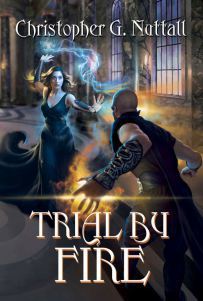 Title: Trial By Fire (Schooled In Magic 7)
Title: Trial By Fire (Schooled In Magic 7)Genre: Fantasy
Author: Christopher G. Nuttall
Website: www.chrishanger.net
Publisher: Twilight Times Books
Sample Chapter HERE.
Purchase on Amazon / OmniLit
About the Book
Three years ago, Emily killed the Necromancer Shadye before he could sacrifice her and destroy the Allied Lands. Now, the shadows of the past hang over Whitehall as Emily and the Grandmaster travel into the Blighted Lands to recover anything Shadye might have left behind, before returning to Whitehall to start the fourth year. For Emily, it is a chance to stretch her mind and learn more about new and innovative forms of magic ... and to prepare for the exams that will determine her future as a magician.
But as she starts her studies, it becomes clear that all is not well at Whitehall. Master Grey, a man who disliked Emily from the moment he met her, is one of her teachers - and he seems intent on breaking her, pushing her right to her limits. In the meantime, her friends Alassa and Imaiqah are acting oddly, Frieda seems to be having trouble talking to her and - worst of all - Caleb, her partner in a joint magical project, is intent on asking her to go out with him.
As she struggles to cope with new challenges and to overcome the demons in her past, she becomes aware of a deadly threat looming over Whitehall, a curse that threatens her very soul. And when she makes a tiny yet fatal mistake, she finds herself facing a fight she cannot win, but dares not lose...
/////////////////////////////////////
Prologue
Caleb stopped outside the stone door to his father's study and paused, feeling his heart pound inside his chest. He had few good memories of his father's study; he and the other children had never been allowed to enter, save for long lectures and punishments when they'd disappointed their parents. Caleb had never dared to try to break the complex network of spells on the lock, knowing it would displease his mother and father.
And both of his parents were formidable indeed.
"Caleb," his mother called. "Come in."
Caleb bit his lip and pushed at the door. The house was small - living space was at a premium in Beneficence - and his mother had had over twenty-five years to weave protective spells and wards into the stone building. She'd always known what her children were doing while they lived in her house. Her children had rapidly learned to keep their misdeeds well away from home if they didn't want to get caught at once. He shivered when he felt another protective ward shimmering over him as he stepped through the door, then bowed formally to his father. His father looked at him for a long moment, and nodded. Beside him, Caleb's mother kept her face impassive.
They made an odd couple, Caleb had often thought, once he'd grown old enough to meet other soldiers and magicians. General Pollock - his father - was short, stubby and muscular, tough enough to march with the younger men instead of riding a horse to battle, while Mediator Sienna was tall, willowy and one of the most experienced combat sorcerers in the Allied Lands. She might not have been classically beautiful, her stern face edged by long black hair, but she was striking, with a trim athletic build even after giving birth to five children. And there were few people who would dare insult her to her face.
"Caleb," his father grunted. He'd never really seen Caleb as anything other than a disappointment, once it became clear that his second son was more interested in theoretical work than fighting. "You wished to speak with us?"
"Yes, father," Caleb said. His parents weren't stuck-up enough to insist that their children make appointments to speak with them, but certain things had to be done formally. The little rituals of politeness, as always, kept civilization going. "I do."
His father waved a hand, impatiently. "Then speak," he ordered.
Caleb took a long breath. Casper - handsome Casper, confident Casper - would have found it easy to speak to their parents, he was sure. But his elder brother had basked in the approval of their father, while even their stern mother could rarely remain angry at him for long. What Casper wanted, Casper got. Their parents hadn't really spoiled Casper, Caleb had to admit, but he'd had advantages none of the younger children shared. He'd set out to walk in their footsteps, after all.
"I ask your permission to open a Courtship," he said, allowing his voice to slip into cool formality. "I ask for your blessings and your wisdom."
His parents exchanged glances. A simple relationship was one thing, but a Courtship was quite another. It implied that Caleb was willing to spend the rest of his life with the girl, if she proved receptive to his advances. And his parents...they might have to welcome the girl into their family, if the Courtship worked out. Caleb was the first of the family to discuss a Courtship. Even Casper had yet to bring a girl home to meet their parents.
His mother spoke first. "Who is this girl?"
Caleb held himself steady, refusing to be swayed by the bite in her tone. "Emily," he said, simply. "Daughter of Void."
"I see," General Pollack said. His voice revealed nothing. "You overreach yourself, do you not? She is a Baroness of Zangaria."
"I am a sorcerer," Caleb countered. He'd known his father would object on those grounds, if nothing else. General Pollack came from aristocratic stock, but his father had been a mere Knight. Grandfather Karuk had been powerful enough to buy his son a commission, yet he'd never been as wealthy and powerful as a baron. "We are social equals."
"And her father is a Lone Power," Mediator Sienna said, slowly. "Do you not fear his thoughts on the matter?"
Caleb hesitated, but pressed on. "That is why I have decided on a formal Courtship," he said. He'd always had the impression that Emily was largely flying free - he didn't think that an experienced sorcerer would have allowed the crisis in Cockatrice to get so badly out of hand - but marriage was quite another issue. "It would allow him a chance to object before matters became serious."
"She may reject you," General Pollack warned. "You are not a wealthy man."
"I know," Caleb said. The family wealth, what little there was of it, would go to Casper, once his parents passed away. General Pollack was a poor man, by the standards of their social equals. But not using his position to enrich himself had made him popular with the troops under his command. "I do, however, have excellent prospects."
His father's face darkened. "But not as a defender of the Allied Lands."
Caleb bit down the response that came to mind. His father had expected his children - his male children, at least - to go into the military, to fight for the Allied Lands. Casper, whatever his flaws, was a halfway decent combat sorcerer. But Caleb? He'd always been more interested in fundamental magic research than fighting. The transfer to Whitehall had been the best thing that had ever happened to him.
"His research may prove useful," Mediator Sienna said.
General Pollack gave her a surprised look.
Caleb couldn't help staring at her in astonishment. His mother might be formidable, but it was rare for her to disagree with her husband in public. Caleb knew they'd had some spectacular rows, yet they'd always been held in private. They'd always put forward a united front.
His mother ignored their surprise. "Do you believe she likes you?"
Caleb swallowed. That was the question, wasn't it? He had never been able to read a girl, to tell if she was interested in him or if she was just being polite. The lads in the barracks had bragged endlessly about how many girls they'd slept with - Caleb was privately sure most of them were lying - but he had never had a serious relationship with anyone. Stronghold had enrolled only a handful of female students, while he'd been too busy at Whitehall to consider the possibilities. He'd never had the nerve to go into a brothel when he'd been on leave.
"I think so," he said, finally. He went on before his mother could start demanding details. "That's why I decided on a formal Courtship. If she thinks otherwise..."
"You can back off without shame," his mother finished. It would be embarrassing to be rejected, Caleb was sure, but better that than getting into a muddle. Courtship, if nothing else, was a ritual intended to ensure that everything was open, without even the merest hint of impropriety. "I would advise you to be careful, though. It is rare for a Lone Power to have a child."
"And one so grossly irresponsible, at that," General Pollack growled. "Inviting both the Ashworths and Ashfalls to the Faire. What was she thinking?"
"She shut them both down," Caleb reminded him.
His mother met his eyes. "Yes, she did," she agreed. "But it was still irresponsible."
"I like her," Caleb said, refusing to look away. "I request your blessing for the Courtship."
General Pollack exchanged a long look with his wife. "We shall discuss it in private," he said, finally. "Wait."
Caleb scowled inwardly as his mother cast a privacy ward, ensuring he couldn't hear a word of what passed between them. It galled him to have to go to his parents, but he knew they would have been furious if he'd approached someone with serious intentions without consulting them first. There were times when he wouldn't have minded being disowned, yet - in truth - he loved his family. Even Casper...
Father has no magic, he reminded himself. And yet he rules the family with a rod of iron.
He looked down at the stone floor, then up as the privacy ward dispelled. His father looked irked, while his mother was smiling coldly to herself. Caleb schooled his face into a dispassionate expression, waiting patiently for their answer. There were strong advantages to the match, he was sure, but there were also dangers. His mother was powerful, yet she was no match for a Lone Power.
"We have considered the matter," General Pollack said. "You may proceed with your Courtship."
Caleb let out a sigh of relief. "Thank you, father-"
"Now we will discuss the practicalities," his mother added, cutting him off. "And precisely how you intend to proceed. You will have to present her with flowers within the month. Choosing the right ones will be important."
"Yes, mother," Caleb said.
He cursed under his breath. It wasn't something he wanted to talk about, not to his blunt, plainspoken mother, but it was clear he wasn't being offered a choice. His father's brief lecture on matters sexual had been bad enough, back when he'd started to realize there was something different about girls, yet this was likely to be worse. He cringed mentally, then steadied himself. At least they hadn't said no.
And now all you have to do is go through with the Courtship, he told himself. And that won't be easy.
Chapter One
...Shadye looms above her, his skull-like face crumbling as the power within him threatens to spill out. Emily stumbles backwards, clutching desperately for something - anything - she can use as a weapon, but there is nothing. The necromancer grabs her shirt, hauls her to her feet and draws a stone knife from his belt. Emily feels her entire body go limp as he holds the knife in front of her eyes, then stabs it into her chest...
Emily snapped awake, feeling sweat pouring down her back and onto the blanket. For a long moment, she was unsure where and when she was; the nightmare had been so strong that part of her half-wondered if Shadye had killed her and everything she'd experienced had been nothing more than the final flickers of life before she died. And then she forced herself to remember, somehow, that she was in a tent, in the Blighted Lands. She'd had nightmares every night since they'd crossed the Craggy Mountains and started their long walk towards the Dark Fortress.
Just a dream, she told herself, as she wiped her forehead. The prospect of returning to Shadye's fortress, where she'd barely escaped with her life, was terrifying. If there hadn't been a very real possibility she'd inherited Shadye's possessions, she wouldn't have chosen to come within a thousand miles of the place. It was just a nightmare. It wasn't real.
She started as something slithered towards her, but smiled as Aurelius butted his head into her thigh. The Death Viper looked up at her beseechingly, his golden eyes somehow managing to convey a sense of hunger even though she'd fed him only the previous night and he should still be digesting his meal. Emily had been told, when she'd brought the snake back to Whitehall, that Death Vipers could live for weeks without eating, while their last meal was digesting in their bellies, but Aurelius seemed to disagree. Perhaps the familiar bond that tied them together demanded more energy...
Or perhaps he's picking up on my hunger, she thought, as she sat upright and picked up the snake. I could do with something to eat too.
Aurelius slithered forward. She giggled helplessly as the snake crawled up her arm and settled around her neck. She reached into her pack, pulled out a piece of dried meat and offered it to Aurelius, then pulled her trousers on, followed by her shirt. Sleeping without her clothes hadn't been easy, but it had just been too hot inside the tent. She knew several spells to chill the air, but the Grandmaster had forbidden her to use magic unless it was urgent. Thankfully, he'd insisted on keeping watch half the night rather than sharing a tent with her.
She crawled forward and opened the flap, then poked her head out of the tent. The Grandmaster was sitting in front of a fire, his back to her, cooking something that smelled faintly like bacon, although she had no idea if it was. It smelled good, but the stench of the Blighted Lands - a faint hint of burning that seemed to grow stronger with every breath she took - threatened to overpower it.
"Good morning, Emily," the Grandmaster said. "I trust you slept well."
"Well enough," Emily lied. There was no point in complaining about the nightmares. "And yourself?"
"You know I don't sleep," the Grandmaster said.
I assumed it was a metaphor, Emily thought, ruefully. But it was true; the Grandmaster hadn't slept since the day they'd walked through the mountains and into the Blighted Lands. It can't be good for his mental health.
She pushed the thought aside as she stood and looked around. The Blighted Lands were strange, perhaps the strangest place she'd ever seen. Lands that had once been green and verdant were now covered in a thin layer of ash. There wasn't a single living thing in sight, apart from the pair of them. A faint haze shimmered in the air, making it hard to see beyond a few dozen meters. The sky was a dull grey, the sun barely bright enough to burn through the clouds hanging in the sky; the air was unnaturally still, tinted with the faint scent of burning, and wisps of raw magic that danced across her awareness for long seconds before fading away. She could barely force herself to remain calm, even though she knew there was no real threat. The landscape spoke to her on a very primal level.
It looked very much like hell.
"I'm pleased to see your monster is taking things calmly," the Grandmaster said, as she paced around the campsite before looking at him. He was a short, wizened man, with a dirty cloth wrapped around his eyes, but he was surrounded by an aura of power she knew to take seriously. "I was worried, but I would have preferred not to deprive you of your familiar."
Emily nodded. If anyone else had tried to wear a Death Viper as a necklace, she knew all too well, they would have died before they could wrap it around their necks. It was hard to remember, sometimes, that Aurelius was one of the deadliest creatures known to exist, with a venom so poisonous that even a mere touch could prove fatal. Only the familiar bond protected her from the snake, allowing her to keep Aurelius as a secret weapon. He'd already saved her life twice.
"He seems to be happier here than I am," Emily admitted. She squatted down and took the mug he offered her with a nod of thanks. The Kava tasted strong, but she knew from experience that it would jolt her awake. "Is that normal?"
"The Blighted Lands may be where the Death Vipers were spawned," the Grandmaster said, as he ladled food onto two plates. "He may feel like he's home."
Emily looked up, staring at the mountains in the distance. "I hope not," she muttered. "I wouldn't want to live here."
The Grandmaster laughed, and passed her a plate of food. "Eat quickly," he urged, as Emily took it. "I want to get to the Dark Fortress before it gets dark."
Emily swallowed. Years ago - so long ago it seemed almost like another life - Shadye had accidentally brought her to the Nameless World, seeking a Child of Destiny. It had never occurred to him that someone would be named Destiny, or that her child would be a literal Child of Destiny. Shadye had meant to kill her, to sacrifice her to something called the Harrowing, yet in some ways she was almost grateful to the mad necromancer. If she'd stayed on Earth, trapped between her stepfather and her suicidal urges, she was sure she would be dead by now.
"Yes, sir," she said, as she ate her meal. It tasted better than anything she'd cooked back on Earth, although the ever-present scent of burning had worked its way into the food. "How long will it take us to get there?"
"About an hour," the Grandmaster said. "Unless we run into trouble, that is."
They finished their breakfast. Emily wiped the plates and cooking equipment while the Grandmaster answered a call of nature, and started to pack away the tent. He hadn't wanted a tent for himself, something that made her feel vaguely guilty, but he'd dismissed the matter when she'd offered to sleep in the open too. She couldn't help feeling relieved; quite apart from her concerns about sleeping near a man, she wouldn't have cared to sleep in the open, not in the Blighted Lands. The raw magic seemed to grow stronger at night.
That must be why so few people risk entering the Blighted Lands, she thought, as she packed up the rucksack. You could go to sleep in the wrong place and wake up in a very different form.
She shuddered at the thought, then pulled the rucksack on and braced herself against the weight. The Grandmaster nodded to her, checked the campsite for anything they might have left behind, then led the way into the distance. Emily gritted her teeth and forced herself to follow him. The flickers of wild magic in the air were growing stronger the further they moved from the Craggy Mountains that blocked the way to Whitehall. If she'd been alone, she had a feeling she would have turned back a long time before reaching the Dark Fortress.
"There's no need to push yourself too hard," the Grandmaster said, slowing. "If worst comes to worst, we'll set up our tents near the Dark Fortress and wait until sunrise."
Emily glanced up. It was early morning, by her watch, but the sun was already high in the sky. And yet, the light seemed dim, the clouds growing darker as they walked deeper into the Blighted Lands. She'd thought it was night when Shadye had snatched her, but had his lands been buried in permanent darkness? Or was she merely imagining things?
"I thought you said it wasn't safe to lurk too close to the fortress," she said instead.
"It isn't," the Grandmaster confirmed. "But I would prefer not to have to enter the Dark Fortress in darkness."
He said nothing else until they stumbled across the ruins of a village, so hidden within the haze that they practically walked into the ruins before realizing they were there. It was hard to imagine that it had once been a living village, with farmers tending their crops and raising their children; now, it was nothing more than grey stone, all life and light leeched away by the Blighted Lands. The eerie sameness sent chills down her spine.
"Be careful," the Grandmaster warned as she peered into one of the buildings. "You never know what might be lurking here."
Emily nodded, pausing as she caught sight of a child's doll lying on the ground. It looked...normal, surprisingly intact despite the Blighted Lands. But when she reached for the doll and picked it up, it crumbled to dust in her hands. She swallowed hard, trying not to cry for the girl who'd owned the doll, untold centuries ago. Had she died quickly, at the hands of a necromancer, or fled with her family to the untouched lands to the north? There was no way Emily would ever know.
"There has to be something we can do for the Blighted Lands," she said, as she wiped the dust off her fingers. "Can't we...cleanse the lands, or something?"
"The necromancers unleashed wild magic," the Grandmaster said. "Every year, some people try to set up settlements within the edge of the Blighted Lands, in hopes of reclaiming the territory for themselves. And they always come to grief. If the necromancers don't get them, the wild magic does."
He took a long look around the village - Emily was sure he had some way to see, despite having lost his eyes years ago - and then led the way out of it, back to the south. She followed him, feeling an odd urge to stay within the village even though she knew it was suicide. It worried her for a long moment - it could be a sign of subtle magic - and then she realized the village had felt safe, despite being within the Blighted Lands. The urge to turn back and flee grew stronger with every step they took.
"The White Council was quite impressed with you," the Grandmaster said. He spoke in a conversational tone of voice, as if he were trying to keep her mind off the growing urge to just turn and run. "They were not too pleased with the management of the Cockatrice Faire, but...they were relieved at the outcome."
Emily nodded. Everyone from Lady Barb to the Grandmaster himself had pointed out that she'd been careless, at the very least, and that her carelessness could easily have resulted in disaster. If the Ashworths and the Ashfalls had gone to war, it would not only have led to the deaths of the leaders of both families, but also to the slaughter of hundreds of other magicians and the devastation of her lands. She knew she'd been lucky, very lucky. If she hadn't managed to get a battery to work...
She touched the ring, hidden within her pocket, and smiled. Lady Barb had urged her to create and charge a second battery while preparing for the trip to the Blighted Lands, and Emily had done as her mentor suggested. Now she had a battery she could use, although without a valve it was useless. And they had a tendency to work once and then burn out. Putting a spare valve together with the help of an enchanter in Dragon's Den had been harder than charging up the battery.
"You showed a staggering amount of power," the Grandmaster added. "They were very impressed."
Thank you, Emily thought, sardonically. Is that actually a good thing?
She eyed the Grandmaster's back, wondering if he knew just what she'd actually done. He hadn't treated her any differently when Lady Barb had returned her to Whitehall after the Faire, but he wouldn't have. Others...had stared at her in awe. In some ways, she was even dreading the day when the rest of the students returned to Whitehall. If they'd stared at her after beating Shadye - and they had - they would be paying far more attention to her now.
"Some of them even considered...insisting...that you take the oaths now," the Grandmaster told her. "Others thought you should be apprenticed at once to someone who could control your power, if necessary."
But I cheated, Emily thought.
It wasn't a reassuring thought. If she'd tried to channel so much power through her mind, it would have killed her or driven her insane. It had been bad enough, years ago, to have people watching her, suspicious of necromancy. Now...they probably thought she was a staggeringly powerful magician instead, a young girl fully on the same level as Void or another Lone Power. The idea that she could match the Grandmaster for raw power was absurd...
...But, to anyone who didn't know about the batteries, it might not seem absurd.
She swallowed. "What are they going to do?"
"Nothing," the Grandmaster said, simply.
Emily blinked. "Nothing?"
"I am Grandmaster of Whitehall School," the Grandmaster said. "I have never had a student forced to take the oaths ahead of time, and I'm not about to start now. If you want an apprenticeship with someone...well, that could be arranged, but you have no obligation to find a master. Or mistress. Still..."
He shrugged. "Have you thought about your career?"
"I don't know," Emily admitted. "I'd like to stay at Whitehall for the rest of my life."
"You'd need much more experience before you could teach," the Grandmaster said. "I like my tutors to have at least ten years of practical experience before they start touching young and impressionable minds. But you could get a slot as a teaching assistant, I suppose, or a research student. We do have a few of them at Whitehall."
He paused, then turned to look at her. "You do need to decide on a major before you enter Fifth Year," he added. "Going by your marks, I'd recommend majoring in charms and perhaps healing, but it depends on what you actually want to do with your life. If you want to be a healer, you'll need alchemy; if you want to be a combat sorceress, you'll need martial magic and history..."
Emily sighed, feeling a little overwhelmed. "Randor expects me to go back to Cockatrice and be the baroness," she said. "I..."
"King Randor," the Grandmaster corrected, quietly.
"But I don't know what I want to do," Emily continued. "There are so many interesting subjects."
"You could probably study them all, if you spread out your years," the Grandmaster mused. "It isn't unknown for students to repeat their last two years at Whitehall. However, most students tend to discover the subject they want to major in while they're in their Fourth Year and stick with it. Your marks in Healing are not bad."
Emily winced. Healing was an interesting class, but she didn't want to spend the rest of her life working with ill people. She'd seen enough of that life during the walk through the Cairngorms to know she didn't want to do it permanently. There had been too many horrors there, hidden in small shacks or behind high stone walls. She had no idea how Lady Barb did it without cursing everyone in sight.
"I think I just want to study," she said. It was a shame there were no universities in the Nameless World. She could have stepped into one quite happily and never come out. "And go into magical research, perhaps."
"That would suit you," the Grandmaster agreed.
He shrugged, then turned back to resume walking. "You need to remember that you're not just any magician," he added, as he walked. "Too many people are already showing an interest in you, not least our friends to the south."
The necromancers, Emily thought.
She'd killed Shadye - and the Allied Lands had declared her the Necromancer's Bane. The other necromancers seemed to believe she could kill them at will, if only because none of them had tried to claim Shadye's lands or attack Whitehall. But that wouldn't last, she was sure. Sooner or later, the necromancers would resume their offensive against the Allied Lands. Their endless need for new victims to sacrifice would ensure it.
And what will happen, she asked herself, when they do?
She kept her thoughts to herself as she followed the Grandmaster, feeling the air grow steadily colder as they made their way to the south. Slowly, the twisted shape of the Dark Fortress - and, beside it, the Inverse Shadow - came into view. They didn't look anything like the half-remembered shapes in her nightmares, but there hadn't really been time to take much note of the scenery the last time she'd visited. She'd been half out of her mind with fear when Shadye's animated skeletons had dragged her into the Inverse Shadow, preparing her for death. If Void hadn't been there, she would have died that day.
The Grandmaster stopped, sharply. "Listen," he said. "Can you hear that?"
Emily paused, listening hard. There was a faint sound in the distance, a howling that seemed to come from many throats. It was growing louder, although she didn't think the source of the sound was actually coming closer. Whatever it was - and there was something about it that touched a memory - it chilled her to the bone.
"I think we'd better go see what that is," the Grandmaster said, after a quick glance at his watch. "Follow me."
July 15, 2015
Profile: Christine Amsden, Author of the Cassie Scot Series
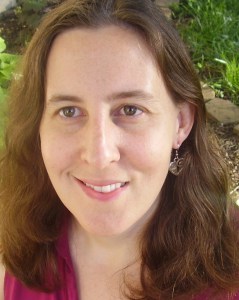
“Writing has taught me the importance of self-confidence in becoming good at anything,” says Christine Amsden, who, in spite of having been diagnosed with Stargardt’s Disease, a condition that effects the retina and causes a loss of central vision, has gone on to become the award-winning, bestselling author of the Cassie Scot: ParaNormal Detective fantasy/mystery series published by Twilight Times Books.
“My parents encouraged reading a LOT,” says this speculative fiction writer, who grew up gobbling up The Chronicles of Narnia, The Baby Sitter’s Club, and Flowers in the Attic. “I know they read to me too, but I was an advanced reader at an early age and preferred to read on my own when I could. I have memories of staring at picture books, making up stories about the pictures though I couldn’t understand the words.” At the tender age of 8, she wrote her first short story, about Cabbage Patch Dolls going to Mars. From then on, she wrote fairly consistently until 2003, which marked the beginning of her professional career when she attended a workshop with Orson Scott Card.
Amsden may be legally blind, but she hasn’t allowed that part of her life to stop her from becoming a prolific author, and nowadays she splits her time between writing, freelance editing, and coaching — with a keen focus on writing. She loves to write about real people defining themselves through extraordinary situations, giving special attention to people and relationships, her way of making science fiction and fantasy meaningful for everyone. “I will continue to marry romance with speculative fiction because I simply love both genres,” states the author. “I love a good character story. I think character is more important than just about anything else, and a great character will have me reading any genre at all and loving it. I get a lot of people telling me that they like my books even though they ‘don’t normally read stuff like that.’ I think it’s because of the characters.”
In what she describes as her messy, cluttered desk, and with a special arm attached to her monitor to help her eyes and back, Amsden creates her stories rich in characterization and world building. Her latest book, Madison’s Song, a companion to her Cassie Scot series, is about a shy young woman who has suffered more than her fair share of betrayal in the past. A friend of Cassie (the only ungifted daughter of powerful sorcerers), Madison now gets a chance to prove that she can be more than a plump, shy sidekick. When her brother’s life is in danger, she faces her greatest fear with head held high to save him. The story is equally about Scott, a werewolf who has fallen in love with a woman he doesn’t believe he deserves.
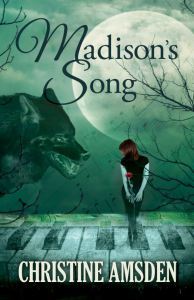 Amsden’s writing style is straightforward and conversational, which is probably why most readers and reviewers describe her work as highly entertaining and fast paced. “I’m not the sort to hide the story behind flowery prose,” she says. “I like the words to get out of the way of the story.” She’s a fast writer as well, finishing the rough draft of the book in only two months, though she then put it aside for a year before revising it, a process that took her five additional months. Her writing process, though fluid, is different with each book. “My best story ideas are the ones that come to me while I’m doing something else, although this doesn’t excuse me from putting in my hours of conscious effort. No two projects that I’ve worked on have developed in exactly the same way, either. I like to try new strategies, mix things up, so life doesn’t get boring.”
Amsden’s writing style is straightforward and conversational, which is probably why most readers and reviewers describe her work as highly entertaining and fast paced. “I’m not the sort to hide the story behind flowery prose,” she says. “I like the words to get out of the way of the story.” She’s a fast writer as well, finishing the rough draft of the book in only two months, though she then put it aside for a year before revising it, a process that took her five additional months. Her writing process, though fluid, is different with each book. “My best story ideas are the ones that come to me while I’m doing something else, although this doesn’t excuse me from putting in my hours of conscious effort. No two projects that I’ve worked on have developed in exactly the same way, either. I like to try new strategies, mix things up, so life doesn’t get boring.”Like the Cassie Scot series, Madison’s Song will also be available in audiobook format, which is how Amsden “reads” most books these days. “It was important to me, when I became an author, to make my books available to listen to as well as read, and not just for others with disabilities. Audiobooks are a terrific way to enjoy books for busy people whose reading time can be combined with a daily commute, or with housework.”
Like most authors, Amsden loves sharing her creative ideas with the world, something which can be understandably challenging. “Nothing is universally liked,” states the author. “I try not to read negative comments or reviews, but it’s almost impossible to avoid all of it. When someone ‘gets me’ I feel an almost euphoric connectedness to the world; when someone doesn’t, (in a really big way), it almost makes me feel isolated.”
The definition of success varies from writer to writer. For Amsden, it has changed since she started writing. “At one time (not too long ago), I had an unrealistic expectation of success that involved becoming a bestseller and making an upper-class living off of my books,” she confesses. “When the Cassie Scot series came out, I sold thousands of books but still didn’t make the kind of money that would let me ‘earn a living’ off of it. It made me rethink my definition of success, because
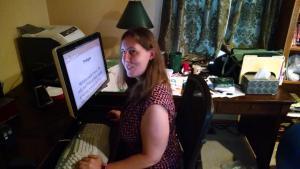 by all measurable standards my books are doing well – I’ve got great reviews, I’ve won several awards, I’ve sold many thousands of books, and I’m making money. I feel most successful when I connect with readers who love my books. So maybe that’s what success is. I’d love to connect with more readers, sell more books, and make more money, but I’m becoming satisfied with who and what I am now. (Like Cassie.)”
by all measurable standards my books are doing well – I’ve got great reviews, I’ve won several awards, I’ve sold many thousands of books, and I’m making money. I feel most successful when I connect with readers who love my books. So maybe that’s what success is. I’d love to connect with more readers, sell more books, and make more money, but I’m becoming satisfied with who and what I am now. (Like Cassie.)”At the moment, the author is waiting for her next book, Kaitlin’s Tale, to be released by Twilight Times Books. She’s also hard at work on a new series set in a completely different world and with a new cast of characters. Though it’s way too early to say much about it, readers can count on it being filled with romance and the paranormal.
A native of St. Louis, Christine Amsden now lives in Olathe, Kansas with her husband, Austin, who has been her biggest fan and the key to her success, and their two beautiful children.
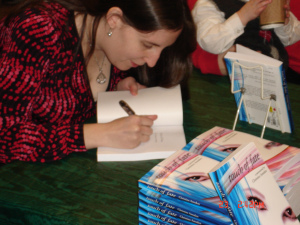 Bibliography:
Bibliography:Touch of Fate (Twilight Times Books, 2006)
The Immortality Virus (Twilight Times Books, 2011)
Cassie Scot: ParaNormal Detective (Twilight Times Books, 2013)
Secrets and Lies (Twilight Times Books, 2013)
Mind Games (Twilight Times Books, 2014)
Stolen Dreams (Twilight Times Books, 2014)
Madison’s Song (Twilight Times Books, 2015)
Connect with Christine Amsden on the web:
Website
Newsletter
Blog
Goodreads
Google+

